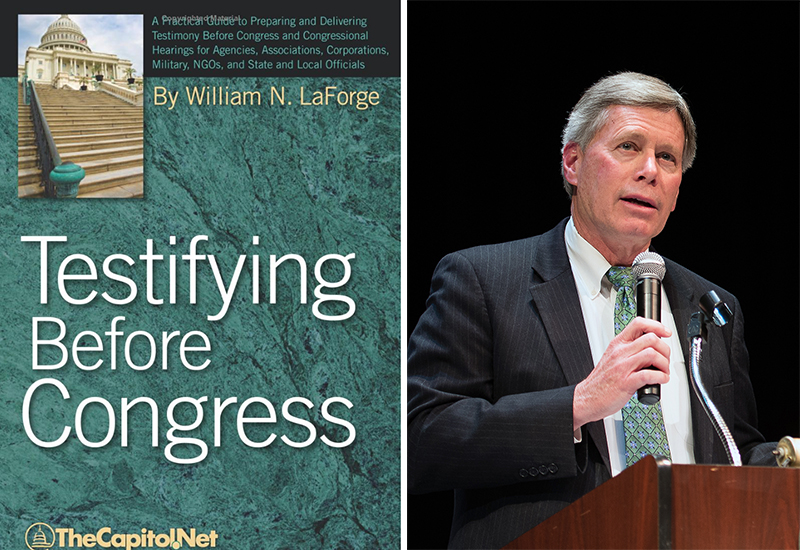
Delta State University President William N. LaForge has been a source of information recently for a number of media outlets calling about a national hot-button issue — testify before congress.
LaForge has been an authority on the subject following his 2010 book, “Testifying Before Congress: A Practical Guide to Preparing and Delivering Testimony Before Congress and Congressional Hearings for Agencies, Associations, Corporations, Military, NGOs, and State and Local Officials.”
The book guides and assists witnesses and their organizations in preparing and delivering Congressional testimony.
LaForge will conduct an on-air interview about the topic with Toronto’s Business News Network and has also been interviewed by NBC.
On April 9, the Harvard Business Review published an interview with LaForge on the subject. The original article can be viewed here: https://hbr.org/2018/04/how-to-testify-before-congress.
Below is the HBR interview, authored by Daniel McGinn, a senior editor at HBR:
How to Testify Before Congress by Daniel McGinn
It’s a predictable part of nearly every big business scandal: the moment when the CEO is summoned to Capitol Hill to testify before a congressional committee. For Facebook founder Mark Zuckerberg, this rite of passage happens this week, when he will testify about data breaches and how foreign states allegedly used social media to try to influence the 2016 presidential election. Observers are already speculating about how Zuckerberg will perform and whether he might join the list of CEOs (like Equifax’s Richard Smith) whose appearance made the company’s predicament even worse. To get a sense of how a CEO should approach this task, I spoke with William LaForge, a former Washington lawyer and lobbyist and author of Testifying Before Congress. (Since 2013 LaForge has served as president of Delta State University, in Mississippi.) The following is an edited, condensed version of our conversation:
HBR: How difficult is it to find the right expertise to help someone prepare for this?
LaForge: Testifying at a congressional hearing is actually very commonplace. There are hundreds of hearings every week when Congress is in session. So there’s a cottage industry of advisers who help prepare people to testify. Most hearings are informational or educational, not adversarial. Many of them are yawners — boring, inside baseball. These sensationalized, highly publicized ones only come along a few times a year. But Washington is filled with lawyers and lobbyists who get clients ready for their day in the hot seat.
What’s the most common mistake CEOs make when preparing to testify?
There are several. One is to act like you’re the smartest person in the room. It’s not just CEOs who do that — look at Judge Bork’s hearing for the Supreme Court back in 1987. Compare that with John Roberts, who may actually have been the smartest person in the room but still behaved with humility and honesty. That approach works much better. You also need to recognize and lead with your key message. During the financial crisis, the automakers’ CEOs flew down in corporate jets, and they talked about it — that became the big issue. Around the same time, the Wall Street CEOs appeared and tried to justify their salaries, at a time when there was public outrage about that issue. That was a mistake. But in general, the biggest mistake — far and away — is failure to prepare properly. You need to do live practice sessions, and watch yourself on video. People may think they’re a naturally eloquent speaker, but you’re on somebody else’s turf, and you’re playing by different rules.
How does preparing an executive for congressional testimony differ from, say, preparing to testify at a deposition or a trial?
Congressional testimony is a much more arcane process, so it’s different. You need to focus on the purpose of the hearing and what the officials on the dais want to hear. You get to submit a written statement and give affirmative remarks, so you’re not just answering questions. Before the hearing, there’s often dialogue between congressional staffers and the CEO’s staff, so you can obtain guidance about what the committee wants to hear — that can be very helpful. You need to understand the format: Everyone speaks in a certain order, with strict time limits. What I would tell Mark Zuckerberg is to make sure you know what the committee needs to hear, get your points across, be conversational, and don’t sound too defensive or apologetic. Repetition is good: What you say in the written statement, your opening statement, and in response to questions should all be the same. [Editor’s note: Here’s Zuckerberg’s prepared testimony.]
Very often, the politicians seem to give mini-speeches rather than asking questions. How does a CEO deal with that?
You just sit there and take it. Learning to do that is part of the preparation. There will be a lot of editorializing, and the rules allow that. There will be peacocks who want to show their colleagues and constituents how much they know about the issue. A witness needs to be callused against that. Don’t interrupt. If there is a question in there, answer it. If there’s something in their comment that’s really factually incorrect, you should correct it for the record. But don’t get hostile.
Are there certain personality types that tend to crash and burn in this format?
The most egregious sign is if the principal is dismissive during preparation — when he says “I’ll be fine” and wants to read the briefing book the night before. This is not a time to be cavalier. This is a time to roll up your sleeves and overprepare. I also worry about high-end Type A people, the ones who like to spar and fight. This is not the time to do either. In this format, the committee members have the first word and the last word.

